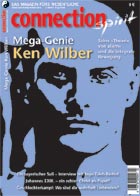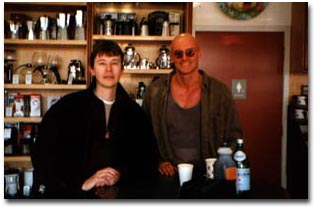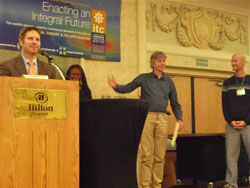|
TRANSLATE THIS ARTICLE
Integral World: Exploring Theories of Everything
An independent forum for a critical discussion of the integral philosophy of Ken Wilber

 Frank Visser founded IntegralWorld.net in 1997 (back then under the name of "The World of Ken Wilber"). He is the author of the first monograph on Ken Wilber and his work: " Ken Wilber: Thought as Passion" (SUNY Press, 2003), which has been translated into 7 languages, and of many essays on this website. He currently is Service Desk Manager at the Dutch divison of the global online marketing agency DigitasLBi.
 Max Korman Max Korman is a 20-year old student of psychology and journalist for the German magazine Connection and a former German regional chess champion. He wanted to check with Frank Visser how he sees the current integral culture. This interview will be published in the Jan/Feb 2013 issue of Connection, which will be devoted to Ken Wilber. IDEOLOGY AND
INFLATION
The Shadow of the Integral Movement
Interview with Frank Visser by Max Korman
for the German magazine Connection
Maxim Korman
Integral institutions are very good at bragging about their own excellence—I call this integral inflation.
Dear Frank, you have observed Ken Wilber and the Integral world for many years. What was (is?) it that fascinates you so much about this man and the movement he represents?
When I discovered Ken Wilber's work in 1982 he had not yet created a movement. He was a solitary scholar who lived high up in the Rocky Mountains writing magnificient books. He was difficult to contact, if at all. Since I liked his books, and every year he was publishing another one, this triggered my interest in getting to meet him in person. It was only in 1995 that I managed to get hold of his fax number, during a visit to the Theosophical Publishing House near Chicago, which had published his early books (The Spectrum of Consciousness, The Atman Project and Up from Eden). When I faxed the questions I had collected over the years about his work he almost instantly replied by fax. This started an intense period of communications about Wilber's ideas and the perennial philosophy, which was back then largely his background philosophy. He even called his approach "perennial psychology" when he started writing.
What fascinated me was the intellectual grasp he seemed to have of the various psychological disciplines he touched, and the way he integrated them with spirituality. In the eighties I was studying the psychology of culture and religion, with an emphasis on mysticism. So Wilber was my second education all through my university years. And of course, for a student eager to learn about how science could makes sense of spiritual experience, Wilber was a perfect role model. He also seemed to master departments of knowledge that are even daunting to the specialist, such as postmodern philosophy.
What was your first impression of him when you first met him?
 Visser and Wilber in a Boulder coffeeshop, 1997 Visser and Wilber in a Boulder coffeeshop, 1997Ken Wilber is a strongly built, muscular guy, sun tanned and cheerful. He also has a fast moving and fluent mind. He was very generous with his time, for after a one night stay at his home in Boulder to get to know each other I returned that same year for a 5-day stay, during which I interviewed him about all his works. Since I had deeply studied his works it was a delight to talk with him about his ideas. My approach was fairly uncritical in those days, I was still a huge fan of Wilber.
What was your reason to write a book about Ken Wilber?
Back home I wrote an article about my first brief visit to Wilber for a Dutch New Age magazine. When it came out, I was invited by Lemniscaat, a Dutch publisher of Jungian books, to write an introduction to his works, an assignement I happily accepted. This resulted in the book Ken Wilber: Thought as Passion, which has been published in 7 countries by now. Around that time, I had created a website related to the work of Ken Wilber, which started out with five pages but has now grown to over 1.000 webpages. This was a direct result of writing my book on Wilber. At the end of the book I state that Wilber's work deserves to be discussed by mainstream science, and for this a summary of his work would be a good starting point. On the website, now called Integral World, I posted from 2000 onwards critical essays on and reviews of Wilber's works.
Around that time, Wilber founded Integral Institute, which seemed an understandable step following on his many years of reclusiveness. But it turned out the beginning of a movement, that became less and less interested in rational reflection, and more and more in infotainment and even the selling and marketing of life style products. The original plan behind Integral Institute was, among other things, to publish textbooks in the various fields of science, that would introduce integral ideas in a way academic science would accept. Instead, years were spent socializing with celebrities. No believable advice to US politicians came out of this think tank, even though integral politics was high on its list of priorities.
It was even tried to start an Integral University, but this project imploded under the weight of its own self-importance. I knew it was a deep wish of Wilber to start a cultural movement such as existentialism, which would apply his ideas to ordinary life and the problems of society at large, as he told me in an interview I had with him in 1995 ("Bodhisattvas are going to have to become politicians"). But popularity is not the same as influence or impact, let alone academic respectability. Over the years, the chances of getting Wilber's ideas validated by specialists in the various fields of science looked slim indeed.
Was there a turning point in your attitude toward Wilber's work?
In 2003 the author Jeff Meyerhoff submitted a synopsis of his book Bald Ambition: A Critique of Ken Wilber's Integral Theory to Integral World. In this monograph, which I subsequently serialized on that site, he covered many fields of science and philosophy—holon theory, postmodernism, history, mysticism, developmental psychology, methodology, and even psychoanalysis -- to assess the value and validity of Wilber's writings, concentrating mostly on Sex, Ecology, Spirituality, Wilber's magnum opus. (The book was released in hard cover in 2010). This opened my eyes to shortcomings in Wilber's works which I, as a former big fan of him, had overlooked. The book met with a complete radio silence from integral quarters, and Meyerhoff was soon branded as a "bad critic", who had misunderstood Wilber's ideas since he lacked the required level of development. Obviously, this is not how the game of science and philosophy should be played. It was typical of the attitude towards online critics Wilber would display over the years and was an obvious attempt to avoid deeper questions about his work.
This was aggravated by Wilber's attempt, in 2006, to silence his online critics in his now infamous Wyatt Earp blog posting, in which he pictured himself and his critics as a sheriff who was chasing cattle thieves and robbers (the blog was called "What We Are, That We See"). Instead of finally taking the time to address the points raised by these critics -- who posted their ideas mainly on Integral World and were often great admirers of Wilber, even if they had different opinions about various details -- he insulted and humiliated them in a long tirade, of which the upshot was, that they lacked the intelligence or developmental status needed to understand his works. The most colorful statement he made was "simply suck my dick". The fact that some days later it turned out that this tirade was done on purpose, to check who of his followers really understood integral philosophy, and who didn't, made things only worse. Since this whole affair was implicitly directed at me, for hosting these critics on my website, that's were Ken Wilber lost most of his credit for me -- and believe me, he had a lot. Wilber chose to see lyers and cheaters in these online critics, who misrepresented his work -- most of these critics accused Wilber of misrepresenting the works of other thinkers. Indeed: What We Are, That We See...
Do you have an explanation for the rise and fall of Ken Wilber?
When Wilber decided to start Integral Institute, he lost much of his integrity.
Looking back, that's where things went really out of hand: When Wilber decided to start Integral Institute, he lost much of his integrity. Instead of offering his ideas to the larger forum of specialists in the field of philosophy and science, he became a politician, who defends his ideas against opposing views and tries to influence his audience with rethoric and slogans ("the integral approach can solve the problems of the world, and everything else makes them only worse"). But in all the years where the integral approach was tauted as "historical" and "ground breaking", no substantial contributions were written, not even when 9/11 struck, and every single intellectual on the planet gave his opinion about it. Wilber preferred to package his ideas about world politics in the format of a novel populated with adolescents (as he did in his book Boomeritis), and his long announced trilogy about terrorism (The Many Faces of Terrorism) is supposedly written in the same style. If these volumes will ever get printed, the world will definitely not lend an eager ear to these immature musings.
You must be disappointed about this whole story...?
Yes, all this became a kind of triple disappointment for me.
- First, Wilber's understanding of the various fields of science did not turn out to be that deep. For example, when I decided to specialize in the field of evolutionary theory to see if Wilber's statements about evolution throughout his oeuvre were solid, the results were no less than shocking, especially to me. The first creationist would make more work of building a solid case for spiritual evolution, but not so Ken Wilber. In a few paragraphs he has tried to put neo-Darwinism in the corner and suggest that it can't explain the natural processes of evolution ("Neo-Darwinian theory can't explain shit. Deal with it."), contrary to the wide majority of science writers. So much for orienting generalizations -- Wilber's claim that he has only gathered together the "already accepted" truths of the various knowledge departments.
- Second, when confronted with this by various online critics, Wilber was unwilling to listen to them, let alone respond, and revise his groteque statements, while at the same time claiming "to know the subject inside out...".
- And third, the integral community which has formed around him over the years could not care less about these intellectual problems. Nobody stood up to be counted—integral ideology had finally set in.
Now that the label "integral" for Wilber's ideas is increasingly replaced by "evolutionary" (see Carter Phipp's recent book Evolutionaries), it would seem to me some solid understanding of this field of evolutionary science is hardly a luxury.
 Visser is awarded at the Visser is awarded at the
Integral Theory Conference, 2010A few years later attempts were made to get a foothold in the academic world by starting an integral Journal and giving integral courses at JFK University and organizing integral conferences. Each respectable field of science has its own scientific journal, so integral philosophy needs one of its own. But this is not the same as opening up integral philosophy to the wider academic world to ask for feedback on its major tenets. Meyerhoff's book Bald Ambition has done more to raise deep questions about the validity of Wilber's ideas. His book was practically ignored by Wilber and his followers. At the Integral Theory Conference in 2010 which I attended, Meyerhoff, who was present to give a talk, was tolerated but not engaged with. Nor did I notice any real interest among the integral students in the issues with evolutionary theory I had presented in my paper ("The 'Spirit of Evolution' Reconsidered").
Now that this integral programme has ended at JFK, a new organization called Meta-Integral has been set up to organize future integral conferences. Again, this organization shows the typical inflation in which everything it does is perceived as unique and historical. Texts are offered about "100 ways to apply the four quadrants", or "130 ways of being an embodied practitioner" of integral theory, but it has a decidely hyper-abstract flavour, so typical of Wilber himself. Integral institutions are very good at bragging about their own excellence—I call this integral inflation.
So the original fascination of seeing in Ken Wilber an independent scholar who could really revolutionize science and philosophy evaporated when he turned out to be deaf to criticism and feedback, even about such innocent things as his repetitive or overly simplistic writing style. Still, his ideas are worthy of further analysis and I hope independent critics will continue to do this necessary work, for which Integral World offers a forum.
Wilber calls Habermas the greatest living philosopher. Was there any exchange between both?
I remember that I had tried to arrange a meeting between the two philosophers, but none of them thought it would be useful. Habermas is supposed to have said "I am too old for this", and Wilber, when I asked him about it said "I know exactly what Habermas thinks, so what's the point of meeting?". It's a strange, almost solipsistic way of looking at things, especially for a thinker who says he values dialogue—even if this often means being in dialogue with him, not the other way around.
There were many intelligent and refreshing people who ended up as their own parody, often they were, first-row-monkeys': Very famous, very loud, and kind of narcissistic. Some of these men were political revolutionaries, but I am also thinking about people such as Osho and Wilber. Do you think there is an archetypal development of such movements?
The Wyatt Earp episode I consider to be an all-time low in integral communication.
It is interesting that you mention Osho in this context, for I was a sannyasin back in 1980, and stayed connected to this movement for about three years. Osho, or Bhagwan as he was called, really struck a chord in me by the lightness and insightfulness of his sermons on the mystical literature of the world (published in hundreds of books). Looking back, I still think his books were unparalleled by any contemporary teacher. However, things ran out of hand when he moved over to Oregon, he made a full U-turn by changing from permissive and unconcerned about the future to restrictive and slightly paranoid (he thought AIDS would destroy two thirds of humanity). He also failed to take responsibility for the degeneration of the community that had formed around him, and that showed a highly narcissistic behavior towards the local community. And then, he was expelled from the United States and travelled from country to country, giving lectures that paled compared to the quality of his earlier talks.
With Wilber a similar pattern is visible. While never being a very accessible person, in his early years he could still respond to different views about his work in a respectful way. After he had founded his own organizations, he became more interested in defending and promoting his own views against a hostile outside world. And the Wyatt Earp episode I consider to be an all-time low in integral communication.
But perhaps these developments are unavoidable. When everybody in your surroundings thinks you are enlightened or you are the "Einstein of consciousness research", as in the case of Wilber, you start believing it yourself. More and more these persons live in a Hall of Mirrors, in which their views are confirmed by the people they engage with, but any criticism that could upset their philosophy is ignored or dismissed, except for occasional over-the-top derisions thinly disguised as intellectual rebuttals.
|

 Frank Visser founded IntegralWorld.net in 1997 (back then under the name of "The World of Ken Wilber"). He is the author of the first monograph on Ken Wilber and his work: "Ken Wilber: Thought as Passion" (SUNY Press, 2003), which has been translated into 7 languages, and of many essays on this website. He currently is Service Desk Manager at the Dutch divison of the global online marketing agency DigitasLBi.
Frank Visser founded IntegralWorld.net in 1997 (back then under the name of "The World of Ken Wilber"). He is the author of the first monograph on Ken Wilber and his work: "Ken Wilber: Thought as Passion" (SUNY Press, 2003), which has been translated into 7 languages, and of many essays on this website. He currently is Service Desk Manager at the Dutch divison of the global online marketing agency DigitasLBi. Max Korman is a 20-year old student of psychology and journalist for the German magazine Connection and a former German regional chess champion. He wanted to check with Frank Visser how he sees the current integral culture. This interview will be published in the Jan/Feb 2013 issue of Connection, which will be devoted to Ken Wilber.
Max Korman is a 20-year old student of psychology and journalist for the German magazine Connection and a former German regional chess champion. He wanted to check with Frank Visser how he sees the current integral culture. This interview will be published in the Jan/Feb 2013 issue of Connection, which will be devoted to Ken Wilber.
